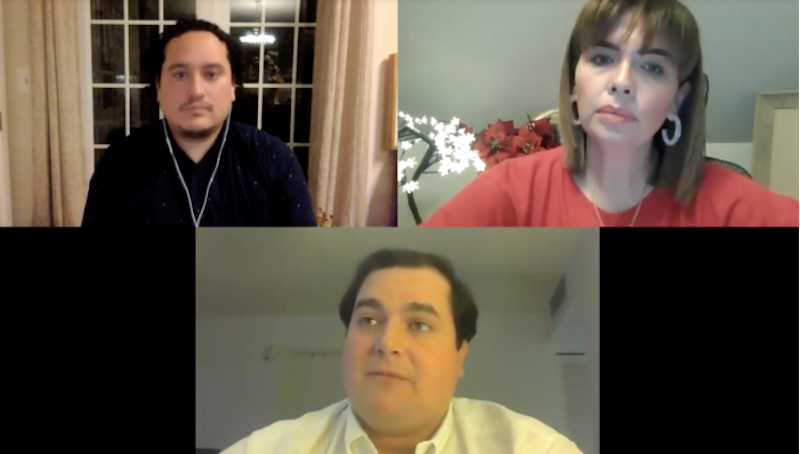On December 17, 2020, the UNA-NCA Sustainable Development Committee in partnership with the International Organization for Migration (IOM) and its nonprofit partner USA for IOM facilitated a discussion about the displacement of refugees and migrants from Venezuela, following the presentation of Walking for Freedom: A Venezuelan Story at the Global Migration Film Festival.

Walking for Freedom: A Venezuelan Story is an immersive 360° documentary short describing the journey of Venezuelan refugees and migrants across the Simón Bolívar International Bridge that links Venezuela and Colombia. The film encourages viewers to quite literally walk a mile in the shoes of refugees and migrants from Venezuela and experience their heart wrenching plight as they walk away in search of new opportunities.
The exodus of Venezuelans is the largest in recent history of Latin America and the Caribbean. Over 5.4 million Venezuelans are living outside of their country as of November 2020. That number is expected to reach 6.2 million worldwide by end of 2021. Colombia, Peru, and Ecuador are their main host countries. A number of difficulties surround refugees and migrants from Venezuela, including decreased income, greater health risks, familial losses, pandemic-related challenges, and increased gender-based violence.
IOM Washington Chief of Mission Luca Dall’Oglio opened the event, which took place on the eve of International Migrants Day. He highlighted the devastating impacts of the COVID-19 pandemic and the precarious conditions facing Venezuelans across the region. The film’s production team then participated in a panel discussion to discuss their experiences filming and the current situation. Maria Moreno, Head of Operations and Private Sector Engagement for USA for IOM, moderated the panel.
Carlos Macher, Director of Walking for Freedom, shared that he hopes to “represent and portray a story that needs to be shared and told in a 360-degree way to open our eyes to the reality before us and is growing.”
Executive Producer Juan Pio Hernandez’s drive is sharing the Venezuelan story and changing the narrative around refugees and migrants. Juan Pio says that the imagery in the documentary short “helps the audience conceptualize this place. With virtual reality, we don’t have a frame anymore… it bridges the gap of being there.”
Macher describes his experience filming at the Simón Bolívar bridge, noting “an artificial bridge has been built and you can see the difference at the yellow doors. As a Peruvian, it is heartbreaking seeing two countries and populations who are historically friends so divided.” He remembers going to the border and the remains of trucks offering aid blocked from entering Venezuela.
This is the epicenter of the crisis. The filmmakers experienced the solidarity in the stories of those who give this movement depth and purpose firsthand. Hernandez says the experience was very emotional and seeing the country’s destruction has been difficult.
Hernandez describes life for Venezuelans in their own country. The coronavirus pandemic has exposed even more opportunities to continue to help. The production team was filming in May and June of 2019.
The situation has worsened since this period. Moreno emphasizes that from the UN’s perspective, there is currently a massive inter-agency emergency response underway in an attempt to assist about 3.3 million people in Latin America and the Caribbean. The Refugees and Migrants Response Plan 2021 calls for $1.44 billion to address the increasingly urgent health and socioeconomic-related needs.
Viewers can visit walkingforfreedom.org to see and share the film. The production team calls for action from all: Funding is needed. The crisis is worsening every day. Macher encourages viewers and advocates to commit to action where they can and beyond. It can be as simple as “sharing a post on Instagram or a link to the film.” He adds, “let’s focus on resilience and let’s talk about contributions Venezuelans bring to our society.”
In closing remarks, Tom Bradley, UNA-NCA Vice Chair of Programs echoes, “let’s work for Venezuelans, advocate for them, support them, resettle them, and make their lives better. They are willing to work to make their lives better – we just need to give them the chance.”
For more information on the film, please visit: http://www.walkingforfreedom.org/








